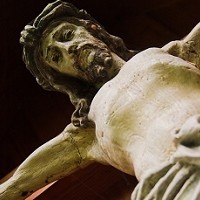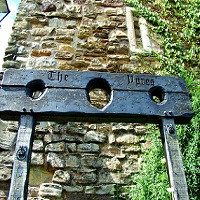About the ninth hour Jesus cried out in a loud voice, “Eloi, Eloi, lama sabachthani?”– which means, “My God, my God, why have you forsaken me?” Matthew 27:46
How does a person of reasonable faith deal with Jesus’ Last Words recorded above? Did God the Father abandon His Son Jesus upon the Cross? If He abandoned Jesus, would He abandon us?
One of the people on my web site’s Iron Sharpens Iron page, Dennis Magary, gave a devotional homily during a Lenten series a few years back. I wondered how he—a seminary professor of Old Testament and versed in Biblical Hebrew—would answer those questions. Instead of answering them, he spoke on Psalm 22 and asked a most memorable question in place of the three above.
“Isn’t it fitting,” he asked, “that while our Savior was dying upon the Cross that He was quoting Scripture?”
I learned a lesson that day. So much of Bible study involves learning to ask the questions that Scripture actually answers. The Bible doesn’t tell us explicitly whether the Father abandoned Jesus or whether Jesus felt like the Father had. The Bible does tell us that God will never leave us nor forsake us (Hebrews 13:5); He will never let anyone snatch us out of His hand (John 10:28-29); and that nothing can separate us from the love of God in Christ Jesus (Romans 8:38-39).
With reassurance like that, we can see Psalm 22 and Jesus’ quotation above in a different light. The words recorded are only a small part of the psalm which Jesus must have had in mind in its entirety as He was dying. Verse one asks, “My God, my God, why have you forsaken me? Why are you so far from saving me, so far from the words of my groaning?”
But then the psalm continues with assurance of calling out to God in distress and a reminder in verses 3-5 “Yet you are enthroned as the Holy One; you are the praise of Israel. In you our fathers put their trust; they trusted and you delivered them. They cried to you and were saved; in you they trusted and were not disappointed.”
And then the psalmist erupts in praise (verses 23-24): You who fear the LORD, praise him! All you descendants of Jacob, honor him! Revere him, all you descendants of Israel! For he has not despised or disdained the suffering of the afflicted one; he has not hidden his face from him but has listened to his cry for help.
And concludes in worship (verse 27-31): All the ends of the earth will remember and turn to the LORD, and all the families of the nations will bow down before him, for dominion belongs to the LORD and he rules over the nations. All the rich of the earth will feast and worship; all who go down to the dust will kneel before him– those who cannot keep themselves alive. Posterity will serve him; future generations will be told about the Lord. They will proclaim his righteousness to a people yet unborn– for he has done it.
As Jesus was dying, the Word made flesh was quoting from Psalm 22 and no doubt experienced the sustaining power of the Word of God, strengthening and encouraging Him onward to victory.
 Mary had known since Jesus’ birth that something would happen to pierce her soul (Luke 2:29-35). It is unlikely she’d ever have imagined crucifixion of her son. So Jesus, upon the Cross, gazes down at His mother and His beloved disciple John. While separating Himself from both family and friend as He faces death, He gives them both a new vision and new relationship.
Mary had known since Jesus’ birth that something would happen to pierce her soul (Luke 2:29-35). It is unlikely she’d ever have imagined crucifixion of her son. So Jesus, upon the Cross, gazes down at His mother and His beloved disciple John. While separating Himself from both family and friend as He faces death, He gives them both a new vision and new relationship. Not “Father, protect me.”
Not “Father, protect me.”  He knew what would happen (Matthew 20:17-19):
He knew what would happen (Matthew 20:17-19):  How do you “love on someone?” Well, you don’t talk about love. You just do it. When you don’t know what else to do, love people and listen for them to inch the door open. Then let words of comfort and peace flow like a gentle breeze into their hearts with a message that refreshes the soul.
How do you “love on someone?” Well, you don’t talk about love. You just do it. When you don’t know what else to do, love people and listen for them to inch the door open. Then let words of comfort and peace flow like a gentle breeze into their hearts with a message that refreshes the soul. When John admonishes us to “walk in love,” it’s not just a cliché of love that he’s talking about. He’s talking about genuine love–the kind Jesus commanded:
When John admonishes us to “walk in love,” it’s not just a cliché of love that he’s talking about. He’s talking about genuine love–the kind Jesus commanded:  We can be in such a hurry to get to the empty tomb of Easter that we barely stop long enough at the Cross to know the importance of His death or consider the prior pivotal importance of His baptism.
We can be in such a hurry to get to the empty tomb of Easter that we barely stop long enough at the Cross to know the importance of His death or consider the prior pivotal importance of His baptism. I love learning origins of words and phrases. This one, interestingly, comes from a play entitled Warning Faire Women (1599): “Upon a pillory – that al the world may see, A just desert for such impiety.” Al is apparently not a typo either, although maybe he was the author but we’ll never know because it was anonymously published. A pillory is a wooden structure with holes for the head and arms—something we often refer to as stocks, used for publicly shaming people. While all this is rather curious, what you may be really curious about is what it has to do with our devotional passage for today–1 Peter 2:19-25.
I love learning origins of words and phrases. This one, interestingly, comes from a play entitled Warning Faire Women (1599): “Upon a pillory – that al the world may see, A just desert for such impiety.” Al is apparently not a typo either, although maybe he was the author but we’ll never know because it was anonymously published. A pillory is a wooden structure with holes for the head and arms—something we often refer to as stocks, used for publicly shaming people. While all this is rather curious, what you may be really curious about is what it has to do with our devotional passage for today–1 Peter 2:19-25.